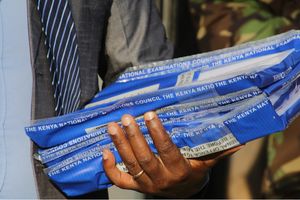
Former Nairobi Governor Mike Sonko at the Anti-corruption Court in Milimani, Nairobi, on February 3, 2021.
| Dennis Onsongo | Nation Media GroupNews
Premium
The State’s elaborate plan to fix Mike Sonko
What you need to know:
- After weeks of bashing President Uhuru Kenyatta, Sonko has in the past five days tasted life on the other side.
- With his bank accounts frozen, Sonko has had one of his toughest weeks.
The legal and political woes that former Nairobi governor Mike Sonko faces are far from over as the State’s security machinery prepares the second stage of an elaborate plan that could send him to jail or force him into submission.
After weeks of bashing President Uhuru Kenyatta, his family and Interior Principal Secretary Karanja Kibicho accusing them of being behind his political woes, Sonko has in the past five days tasted life on the other side.
With his bank accounts frozen, having lost the governorship and with court cases piling up, Sonko, a mercurial politician who rose to govern East Africa’s commercial hub before tumbling down has had one of his toughest weeks. At some point, his machismo dissipated and he broke down in tears.
And he still has three days behind bars after two magistrates on Thursday declined to rule on his bail applications.
Chief Magistrate Stella Atambo of Kiambu Law Courts, where Sonko was arraigned for alleged assault, declined to make a ruling until Tuesday, while Kahawa West Chief Magistrate Diana Mochache said she will issue a ruling on whether Sonko can be held on terrorism charges.
The nighttime session at Kahawa West on Wednesday did not gone unnoticed, with Law Society of Kenya (LSK) president Nelson Havi expressing concerns that “the more things change in Kenya, the more they remain the same”.
“We are keenly watching those Magistrates and Prosecutors,” Mr Havi tweeted.
Corruption cases
Both magistrates will give their rulings on Tuesday. Their decisions will be crucial to the executors of Mr Sonko’s trials, who are hell-bent on keeping him in custody for as long as possible.
Mr Sonko is already facing three corruption cases in court and an assault case filed on Monday this week.
The Director of Public Prosecutions (DPP) has indicated that he intends to charge Sonko with forming and arming a terror group.
Although the five cases will definitely keep the former governor busy with court appearances and hearings, they will not prevent him from accessing a megaphone on social media, where he has a huge following, if he walks free on Tuesday.
The accusations that Sonko is facing in court can get him a bond. This means that should Chief Magistrate Atambo grant him bail on Tuesday and Chief Magistrate Mochache declines to remand him as asked by the State, the former governor will go home.
That may, however, not be the end of his tribulations, as the state security machinery has a raft of accusations and unfinished investigations against the former governor. If activated, they could send him back in the dock as soon as he walks free.
According to well-placed security sources close to the investigations say sleuths have been combing his social media pages to extracting evidence of incitement, hate speech and defamation of state officials to prefer charges against him.
Hate mongers
On Thursday the National Cohesion and Integration Commission listed Sonko alongside MPs Simba Arati, Johanna Ngeno and Silvanus Osoro on the List of Shame of hate mongers.
“If a politician or any other Kenyan has appeared on the List of Shame more than three times, he or she will be promoted to the Wall of Shame. We are working with other agencies to ensure they do not hold any political office ever,” warned NCIC chair Samuel Kobia.
Additionally, the matter of how Sonko disappeared from Shimo La Tewa Prison 23 years ago has been resurrected, although it doesn’t seem to be getting traction so far.
The Saturday Nation understands that investigators are having a difficult time getting all the required documentation that they could use to send Sonko back to Shimo La Tewa to complete his jail term.
However, investigators are concentrating on three possible legal routes to file additional charges against Mr Sonko. He is being investigated for libel, misusing a technology device or undermining the authority of a public officer.
The Penal Code states that “any person who, by print, writing, painting or effigy, or by any means otherwise than solely by gestures, spoken words or other sounds, unlawfully publishes any defamatory matter concerning another person, with intent to defame that other person, is guilty of libel.”
Criminal libel is however unconstitutional following a February 2017 ruling by the High Court which declared Section 194 of the Penal Code incompatible with the Constitution.
Peaceful protesters
The law which has been used in the past by the government to crack down on bloggers and those perceived to be critical to the state was declared by the courts to be unnecessary, excessive and unjustifiable since it limits the freedom of expression.
Before the ruling, those found guilty of this offence were being jailed for two years.
Similarly undermining the authority of a public officer is also currently unconstitutional after being declared so by the High Court in 2017 following a suit challenging the law filed by blogger Robert Alai.
Mr Sonko could however find himself in trouble should investigators decide to charge him with Section 23 of the Computer Misuse and Cyber Crime Act. The law was suspended in 2018 and reinstated in February 2020 following a case filed by the bloggers association citing freedom of speech.
Yesterday, pockets of Mr Sonko’s supporters held peaceful protests in Nairobi demanding his release.
The demonstrations were, however, a far cry from two years ago when police were forced to lob tear gas to disperse protesters who jammed the Ethics and Anti-Corruption Commission offices in Nairobi when Sonko was summoned for questioning. His political allies have taken to social media to demand his release.
“Even if Sonko is guilty as accused, his case must be processed in accordance with the Constitution,” said former Kakamega senator Bonni Khalwale yesterday.
“Every arrested person has the right to appear in court within 24 hours and the right to fair trial, including bail. Detention without trial is back.”





